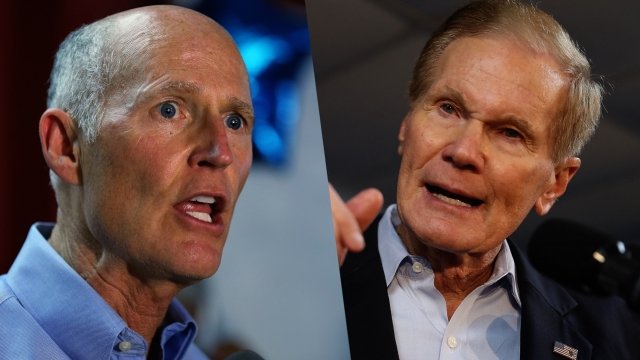Voting has been underway for more than a week in Florida, by far the most populated of the swing states.
It's also hosting a neck-and-neck Senate race — one that's already secured first place as the most expensive congressional contest of 2018.
The match-up is between Democrat Bill Nelson, who's been a senator for 18 years, and Republican Rick Scott, who's at the end of his maximum eight years as the state's governor.
The long shot hope the Democrats have of taking back the Senate, which is now 51 to 49 Republican, counts on Nelson winning a fourth term.
But unlike so many races, which are referendums on the first two years of President Donald Trump, this contest is focused on more localized issues.
Scott has kept an unusual amount of distance — for a Republican — from Trump, to the point that he did not mention the president a single time in the first Senate debate.
Nelson, unlike many other Democratic senators trying to hold on in states Trump carried two years ago, hasn't talked about trying to find areas of agreement with him.
The governor is touting the state's economic growth on his watch.
The senator says the state has reaped plenty from his Capitol Hill seniority in which he's now the top Democrat on the Commerce, Science and Transportation Committee.
Scott is highlighting his efforts to help with the recovery after Hurricane Michael devastated the Panhandle.
Nelson says he's done whatever he can to get federal aid to the region. The two have been faulting one another over the red tide and algae blooms fouling the waters off the state's coast.
Nelson says Scott caused the environmental crisis by eliminating funding for agencies that regulate development and water quality.
Scott says it's Nelson who's to blame for not delivering federal funding to improve flood prevention and pollution control.
Gun control is an especially hot topic in Florida. Horrendous mass shootings took place at Pulse nightclub in Orlando in 2016 and at Marjory Stoneman Douglas High School in Parkland this year.
Scott did sign a law that raised the gun-buying age to 21 and boosted spending on mental health. It also allows school districts to arm their employees — and Scott refused to back a ban on assault weapons or close the so-called "gun show loophole."
Nelson supports efforts to prohibit sales of assault weapons and tighter background checks.
And this is the one Senate race where Cuba is an issue. The GOP governor supports Trump's plans to reverse the start of more normalized relations with the communist island.
The Democratic senator is critical of the Castro regime but has supported the opening of ties to Cuba.
When he was a new governor, Scott refused $2.4 billion in federal money to start building a high-speed rail line between Tampa and Orlando. Now he says it's a good idea.
Nelson always supported the project and has used his Senate position to steer billions to public works across the state.
These two disagree about national issues as well. Scott says he would have voted to confirm Brett Kavanaugh for the Supreme Court. Nelson voted no.
Scott has always been an outspoken opponent of the Affordable Care Act. He prevented Florida from expanding Medicaid to get more poor people insured and is now part of a lawsuit by GOP-run states that's seeking to undermine the law and its protections for people with pre-existing conditions.
Nelson is proud of his vote for Obamacare, which he says has meant insurance for 2 million more Floridians.
No matter who wins, Scott and Nelson will make history for contesting the year's most expensive race for Congress.
According to the nonpartisan Center for Responsive Politics, $70 million had been spent by the candidates and another $66 million by outside groups — and those numbers are only going to go up with the final few days of TV advertising before Election Day.


